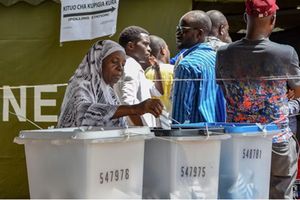Bongo Flava cradle rocking

Rocking the cradle: Bongo Flava artiste Diamond issued un precedented scathing attack at the ministry early this week after his somgs were blacklisted PHOTO | FILE
What you need to know:
So here we are, in a house so divided with opinion so polarized than ever before, especially when you value the right to speak freely or even not to speak at all in our showbiz!
Symbolism for all its wealth and power so often invites misinterpretation, for it is not in the discretion of the artiste to tell the audience what he means by every word in his creativity.
So here we are, in a house so divided with opinion so polarized than ever before, especially when you value the right to speak freely or even not to speak at all in our showbiz!
This has been a week of actions and counter activity between the powers that be and the artistes who feel aggrieved with the ban of some of their creative works.
The authorities on their part maintain that the songs were in violations of Tanzanian social norms and therefore very distasteful – the verdict was to get them off airplay and cannot be performed anywhere.
Even after they were hosted at Basata where the deputy minister Juliana Shonza labored at great length to explain the reasons why the songs were banned the artiste still held their ground.
Some chose to remain silent, though golden, silence is sometimes wrong for it is defined by what it doesn’t say than what it means.
But that was only for a while; during his launch of his sophomore album ‘A Boy from Tandale’ in Nairobi it was quite evident that something was not right.
A protracted war of words between the deputy minister and Diamond Platnumz whose two hit singles ‘Waka Waka’ featuring Rick Ross and ‘Hallelujah’ featuring Morgan Heritage were banned due to explicit content.
However, both songs are featured on the singer’s album which is set to hit stores in hard copy this weekend in Dar es Salaam.
The deputy minister and the ministry say it was an institutional decision and not a personal problem as the artiste had portrayed in his radio interview on Times FM on Monday.
The singer who is set to become the first Tanzanian to perform at the World Cup finals this summer in Russia believes there wasn’t enough inclusion by the arts council before they decided to black list his songs.
Diamond’s scathing attack was not taken lightly as the minister supported by other officials from the arts council stood their ground urging the artiste that if he felt aggrieved then he should appeal the decision through the correct channels.
“Whatever Diamond is saying is simply not acceptable he is not following the established procedure,” Godfrey Mungereza told Mwananchi Digital.
He says the procedure at the council requires artiste to submit their audios to Basata and the videos to the film board before releasing them in the public domain.
This, according to the artistes, limits their creative ability and their freedom of expression for that is the very aim that art serves.
The ban as our survey around night clubs over the weekend shows, some of these songs are among the most requested on DJs’ playlists including Barnaba’s explicit ‘Nampaga’.
Old songs
Of one of the issues that artistes are raising is the fact that some of the black listed songs have been around for almost six years yet they were released under the watch of the current administration.
Songs such as Snura’s Nimevurugwa is a long forgotten songs which was at one point a hit song that did rounds in many entertainment circles as opposed to Chura which was banned almost immediately but later on given green light. The two songs were released in 2013 and 2016 respectively.
Diamond’s Hallelujah has been on air since September 28 gaining over 9 million views on Youtube, the song according to Basata is a threat to national cohesion as it violates other people’s religious beliefs.
‘Waka Waka’ that feature Rick Ross on the other side has been on air since December 7 gaining some 6 million views on Youtube was black listed for indecency.
Gigi Money may be was the most affected after her debut single ‘Papa’ which was quite famous with slay queens in the city after it was released in August 2017.
These songs could have violated the all the established rules at the council, the question that commentators are asking is why has the council chosen to act now and not then when the songs were released.
Culture versus modernity
The issue of morality and culture is a thorny one that officials keep citing; according to authorities singers should embody Tanzanian culture and morality in the compositions.
This means they ought to dress, dance and even the diction of their lyrics should put into consideration Tanzanian values before anything else.
Tanzania is a country with over 120 tribes, each with very unique foods, music, dance, dress, arts, beliefs and languages which are some of the things that form important components of culture.
The national dress remains an elusive affair even after several attempts have been made to come up with one, in the process spending millions of money in the futile affair.
This whole thing is getting complicated!
In the face of an onslaught of modernity and foreign influence, what makes up Tanzanian culture is still a very debatable affair, for even Bongo Flava which has been christened as ‘our music’ is not truly Tanzanian for it borrows heavily from the West.
What continues to hold this music together is the fact that it is sung in Kiswahili, save for a few who have tried to perform local genres such as Singeli and Taarab.
As many a commentator admit, most traditional dances do not take care of some of the modern day requirements of our culture such as decent dressing the authorities demand.
Foreign content
Though the advent of Bongo Flava has tried to slash the amount of foreign content that is played on our radio and TV stations in the last decade or so, it has not completely limited the amount of such content that is consumed in Tanzania.
Some of which are in complete violation of some of the very gospel that authorities preach, in fact some of the material rated PG very often finds its way into the public domain.
The proponents of this crackdown say it is something ought to have happened a long time ago and that it should be extended to such foreign content as well given the kind of influence that it has on young people.
“If it is not possible to watch Giggy Money’s video, how are you going to brave Nicki Minaj’s or Rihanna’s videos which are very explicit?”
They strongly advise that Bongo Flava artistes should take the route that some Western musicians have taken by making club and radio edit versions of songs




